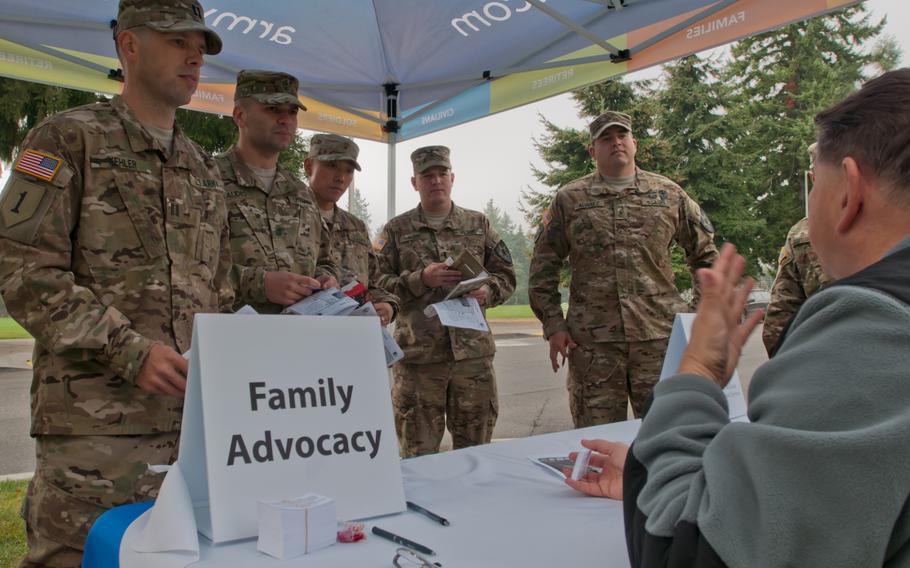
Bob Steger, a program specialist at Joint Base Lewis-McChord, Wash., talks to soldiers about family advocacy classes. On Thursday, Sens. John Cornyn, R-Texas, and Kyrsten Sinema, D-Ariz., introduced the Military Domestic Violence Prevention Act, a bill that takes aim at improving the Defense Department’s Family Advocacy Program through better resourcing, sharing more information about its services with families and enhancing coordination between the military service branches. (Sarah Enos/U.S. Army)
AUSTIN, Texas — Two senators have introduced a bipartisan bill to improve staffing levels for a Defense Department program designed to address domestic abuse while also raising awareness of the program’s existence among military spouses.
Sens. John Cornyn, R-Texas, and Kyrsten Sinema, D-Ariz., introduced the Military Domestic Violence Prevention Act, which takes aim at improving the Defense Department’s Family Advocacy Program through better resourcing, sharing more information about its services with families and enhancing coordination between the military service branches, according to a joint news release from the senators.
“Domestic violence survivors in the military deserve our full support as they rebuild and recover, and we owe it to them to ensure perpetrators are held accountable,” Sinema said in a statement issued Thursday. “Our bipartisan bill empowers survivors by improving counseling and encouraging reporting on military bases, ensuring the health and safety of everyone in our military communities.”
The bill requires the Family Advocacy Program to report to Congress on staffing “to ensure the program is properly resourced,” according to the news release. As of now, this specific staffing information is not reported to Congress, according to an aide in Cornyn’s office speaking on the condition of anonymity.
Delivered through the service branches, the Family Advocacy Program addresses domestic abuse, child abuse and neglect and problematic sexual behavior in children and youth, according to its website. It also coordinates with military and civilian agencies to prevent and identify abuse and provide appropriate treatment for affected service members and their families.
Incidents reported to the program make up the information available in an annual Pentagon report on the prevalence of domestic abuse among service members and their families. The fiscal year 2019 report, released in April, stated the Pentagon funds more than 1,950 positions in the military departments for clinical providers, domestic abuse victim advocates, new parent support personnel and prevention staff. The report did not describe how those staffers are divided among military bases or whether all funded positions were filled.
The report also stated 7,921 of the 13,571 incidents of domestic abuse reported to the program met the program’s definition of abuse, which is “domestic violence, or a pattern of behavior resulting in emotional or psychological abuse, economic control, and/or interference with personal liberty that is directed to a person who is a current or former spouse, a person with whom the abuser shares a child in common or a current or former intimate partner with whom the abuser shares or has shared a common domicile.”
There were 12 confirmed domestic abuse fatalities in 2019 involving military personnel as perpetrators or victims, according to the Pentagon report.
Fewer than one in five domestic violence survivors now self-report to their base’s advocacy program, according to the senators. To raise awareness, the bill creates a pilot program to educate spouses about it when they receive a military identification card and enroll in Defense Enrollment Eligibility Reporting System, known as DEERS.
The senators cited two deaths this year of service members from their home states who told their friends and families that they felt their safety was threatened by a peer, but did not make official reports on base.
Army Spc. Vanessa Guillen, a Texas native, was killed in April at Fort Hood, Texas, by a fellow soldier who her family said had previously sexually harassed her.
Air Force Airman 1st Class Natasha Aposhian of Arizona was shot and killed in June at Grand Forks Air Force Base, N.D., by another airman. She had dated the man, but recently told him that she did not want to continue seeing him, according to her parents.
Some victims choose not to report domestic violence because of community stigma and fear of retribution from the perpetrator, according to a report from the RAND Corporation.
“Service members who put their lives on the line shouldn’t have to fear reporting domestic violence or face dealing with the resulting trauma alone,” Cornyn said in the statement issued Thursday. “In addition to funding education and prevention programs, this legislation would encourage members of the military and their families to seek help while ensuring they have access to the resources they need to heal.”
The bipartisan bill also requires the Defense Department to produce a report on solutions to encourage reporting and identify lessons learned that can be shared between service branches and bases.
The National Resource Center on Domestic Violence, an organization that conducts research and provides comprehensive information and resources on domestic violence, applauded the efforts of the bill.
“We know that domestic violence is preventable,” according to a statement from the center. “We also know that survivors of violence in the military face unique circumstances that compound their vulnerability and increase barriers to safety and healing.”
The senators said they’ve received endorsements on the bill from two military-specific advocacy organizations, Protect Our Defenders and the Modern Military Association of America.
“Far too often, service members and their family members do not seek help when dealing with domestic violence, resulting in serious consequences that could have been prevented,” said Jennifer Dane, Air Force veteran and interim executive director of the Modern Military Association of America. “Our military families deserve better, and it’s critical that we take action to stop the escalation of violence through earlier education, prevention, and treatment.”
Thayer.rose@stripes.com Twitter: @Rose_Lori